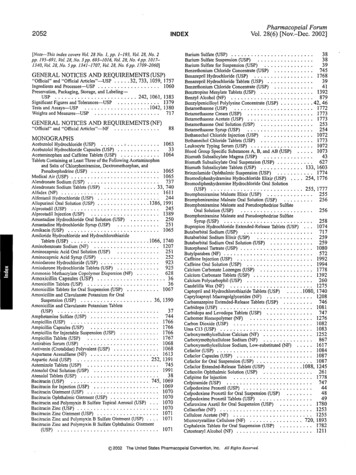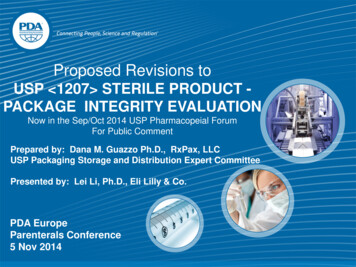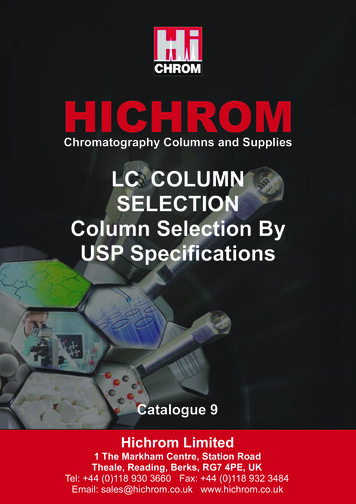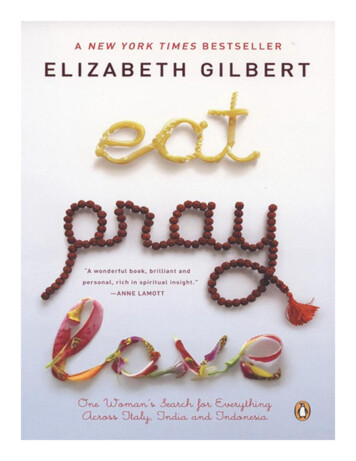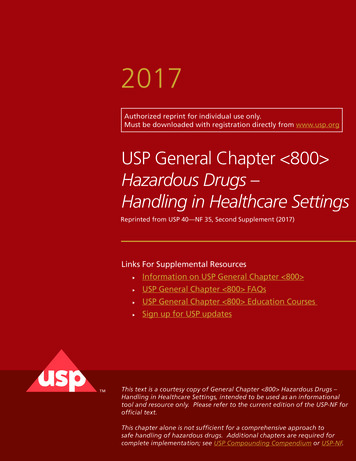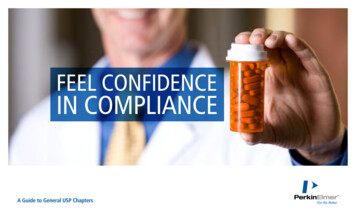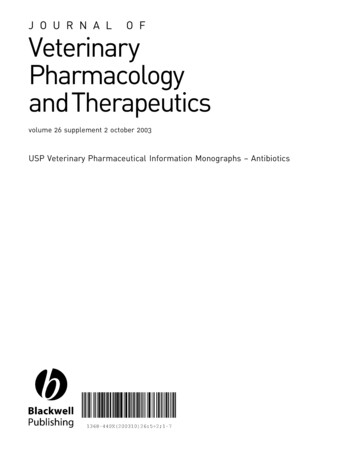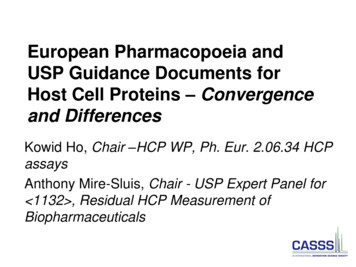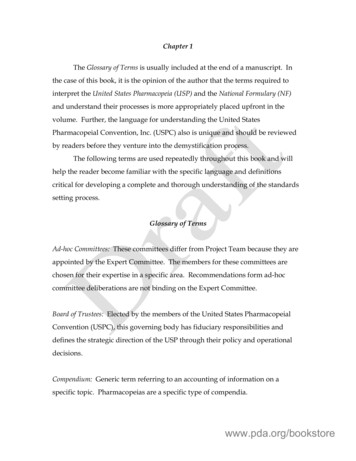
Transcription
Chapter 1The Glossary of Terms is usually included at the end of a manuscript. Inthe case of this book, it is the opinion of the author that the terms required tointerpret the United States Pharmacopeia (USP) and the National Formulary (NF)and understand their processes is more appropriately placed upfront in thevolume. Further, the language for understanding the United StatesPharmacopeial Convention, Inc. (USPC) also is unique and should be reviewedby readers before they venture into the demystification process.The following terms are used repeatedly throughout this book and willhelp the reader become familiar with the specific language and definitionscritical for developing a complete and thorough understanding of the standardssetting process.Glossary of TermsAd-hoc Committees: These committees differ from Project Team because they areappointed by the Expert Committee. The members for these committees arechosen for their expertise in a specific area. Recommendations form ad-hoccommittee deliberations are not binding on the Expert Committee.Board of Trustees: Elected by the members of the United States PharmacopeialConvention (USPC), this governing body has fiduciary responsibilities anddefines the strategic direction of the USP through their policy and operationaldecisions.Compendium: Generic term referring to an accounting of information on aspecific topic. Pharmacopeias are a specific type of compendia.www.pda.org/bookstore
Council of Experts: This is the official standard setting body of the USP. Thecouncil is comprised of the Expert Committee Chairs elected to serve five yearterms by the members of USPC.Expert Committee: The group of individuals assigned to address, deliberate andvote on issues affecting monographs, general notices and requirements, generaltest chapters and general information chapters in the USP that fall within thejurisdiction of their assigned committee. The chairs of the various committeesare elected by the members of the USPC and subsequently, members of thecommittees are selected at a meeting of the chairs. Committee members vote toapprove or disapprove information scheduled to be officially adopted in the USPor NF and their associated supplements or via an Interim RevisionAnnouncement.Expert Committee Member: An individual, elected by the committee chairs, toserve a five year term on an Expert Committee. Candidates are selected based onthe details of their applications for membership and their expertise andknowledge in a specific scientific discipline.Expert Committee Chair: Elected by the members of the USPC, the chairs of ExpertCommittees serve five-year terms and are responsible for executing the workplan of the committee they lead.Food and Drug Administration (FDA): The U.S. government agency which hasenforcement discretion for the standards published in the United StatesPharmacopeia / National Formulary (USP/NF) for products or materialsdistributed within the United States of America.www.pda.org/bookstore
General Test Chapter:Instructions for performing certain test methodologiesrepeatedly referenced in the monographs.Typically, the methodology isindependent of the item being tested (e.g., Loss on Drying, pH, Residue onIgnition). General test chapters are assigned numbers from 1 to 999.General Information Chapter: Usually theoretical and interpretive in nature thesechapters discuss methodology and manufacturing concepts not referenced by anindividual monograph.General information chapters are assigned chapternumbers from 1000 to 1999.In-process Revision Announcements:Proposed changes affecting the officialstandards published for public comment in the Pharmacopeial Forum.In-process Revisions indicate the monograph change being considered and theproposed USP/NF volume in which it will become official adopted (e.g., USP 30,NF25, 2S (USP30), etc.) The appearance of items in this section of the PF officiallystarts the public review comment period.Interim Revision Announcement (IRA): Published in the Pharmacopeial Forum(PF), the IRA is the mechanism for adopting official changes in-between theissuance of the annual publication or its supplements and is typically reservedfor items requiring immediate implementation.Monograph: The specific tests, analytical procedures, and acceptance criteria fordetermining the strength, quality, purity, and potency for a given compendialarticle.Additional information such as storage conditions, nomenclature,chemical formulae, and the applicable USP Reference Standards also areincluded in the monograph.www.pda.org/bookstore
National Formulary (NF):Originally published as a separate collection ofstandards, it was purchased by the USP and merged into one volume with theUSP in 1974. This compendium now contains monographs for items typicallyused only as excipients. It is revised on the same publication cycle as the USPand its contents become official on January 1 of a given year unless otherwisenoted in the text.Pharmacopeia: Legally binding document governing the quality, strength andpurity of medical items of commerce in a specific geographical region. The USPNF apply to products marketed in the United States of America as well as manyother countries around the world, the European Pharmacopoeia (EP) applies toproducts marketed in the European Union and the Japanese Pharmacopoeia (JP)applies to products marketed in Japan.Pharmacopeial Discussion Group (PDG): ): Representatives from the EP, the JP andthe USP that generally meet twice per calendar year to harmonize excipientmonographs and general chapters common to all three compendia.Pharmacopeial Forum (PF): Published 6 times per calendar year it is used tointroduce proposed changes to official items contained in the USP/NF and beginthe public review process where interested parties can comment on the merit ofthese proposals. Items included in the PF have not been formally adopted byUSP. IRAs are published in PF.Project Team:USP Project Teams are working groups associated with andsanctioned by the Stakeholder Forum participants. The majority of these Teamswork under the auspices of the Prescription/Non-Prescription StakeholderForum (P/NP SF). Project Teams have specific goals and are not intended to belong term committees. Project Team members are chosen representatives fromwww.pda.org/bookstore
the Stakeholder Forum member organizations. USP Expert Committees arewelcome to attend Project Team meetings but must do so as representatives ofthe USP. Recommendations made by the project teams are not binding on theUSP.Resolution: The start of the standard setting process, resolutions are voted on bythe USPC members and define the strategic direction of the USP in a given fiveyear cycle. Resolutions may be carried over from one five year cycle to anotherbut would have to be voted on again at the Convention leading up to the secondcycle.Revision Cycle: The five year period between conventions in which the electedExpert Committee chairs and their elected members conduct the standard settingbusiness of the USPC. The current revision cycle is 2005-2010.Scientific Liaison: An employee of the USP who is responsible for facilitatingdiscussion between the Expert Committee and various sectors of thepharmaceutical industry. The scientific liaison is responsible for briefing theExpert Committee members on the issues (pros and cons) related to specificchange requests to official items in the USP/NF.Stakeholder Forum: Stakeholder Forums were initiated in 1999 and became anofficially recognized component of the USP family by a vote at the 2005convention. The most active Stakeholder Forum has been the P/NP SF. P/NP SFmeetings are held biannually on an established schedule and provide theopportunity for USP to interact with representatives from scientific and tradeassociations. Among the participating organizations sending representatives tothese meeting are the Generic Pharmaceutical Association (GPhA), ParenteralDrug Association (PDA) and the Pharmaceutical Research and Manufacturers ofwww.pda.org/bookstore
America (PhRMA). Representatives from FDA generally attend these meetingsas well. There are currently three active stakeholder forums: 1) P/NP SF, 2)Compounding, and 3) Biotechnology and Biological. In addition, USP plans toreestablish the Patient Safety Stakeholder Forum.Supplements:Published twice per calendar year, Supplements are USP’smechanism for officially adopting changes in-between the annual publication ofthe main volume. The 1st and 2nd Supplements become official on April 1 andAugust 1, respectively, of any given calendar year.United States Pharmacopeia (USP): Originally pubished in 1820 on a periodicschedule and yearly since 2002, this compendium contains monographs for yproducts,dietarysupplement, general test methodology and general information used to establishquality standards for these articles that are legally marketed in the United States.This volume’s contents become official on January 1 of a given year unlessotherwise noted in the text.United States Pharmacopeial Convention (USPC):Previously called theQuinquennial meeting, the convention meets every five years.Memberorganizations send delegates to vote on changes to the USP by-laws andconstitution, elect the members of the Council of Expert, elect Board of Trusteemembers, conduct business meetings, and debate and vote on Resolutions.Now that you are armed with an understanding of some of the specificpharmacopeial terms and language, you are ready to begin the journey ofdemystifying the USP processes. Through this journey you will learn how youcan participate and, more importantly, how you can impact this standard settingorganization.www.pda.org/bookstore
Chapter 1 The Glossary of Terms is usually included at the end of a manuscript. In the case of this book, it is the opinion of the author that the terms required to interpret the United States Pharmacopeia (USP) and the National Formulary (NF) and understand their processes is more appropriately placed upfront in the
